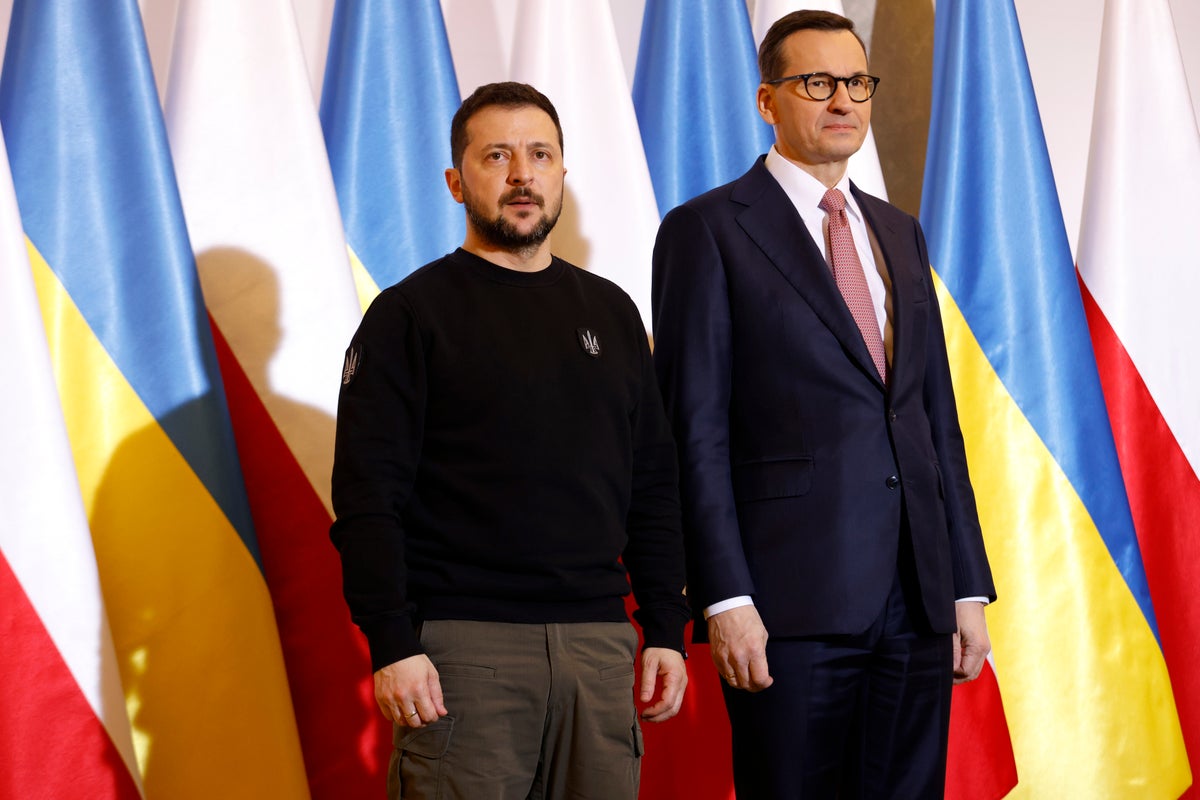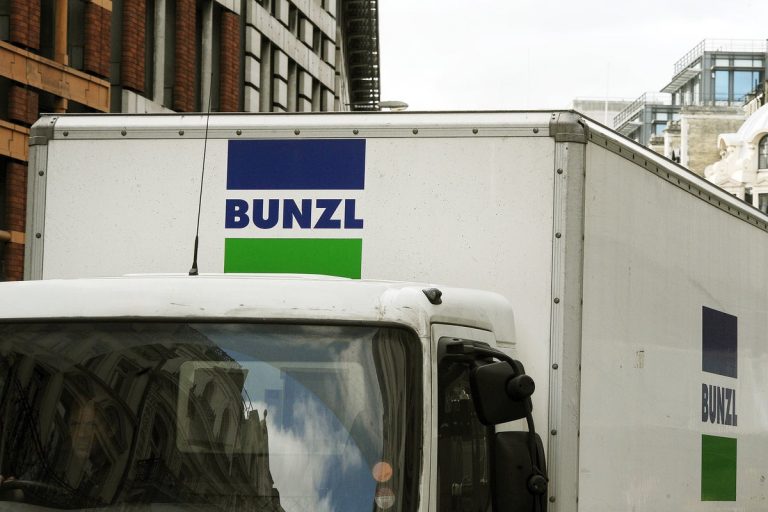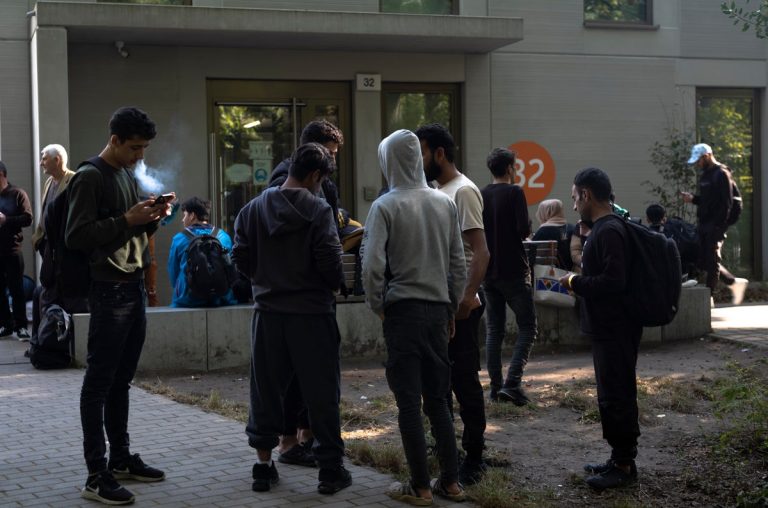Why has Poland stopped supplying weapons to Ukraine?

For free real time breaking news alerts sent straight to your inbox sign up to our breaking news emails
Sign up to our free breaking news emails
Poland has announced it will no longer be sending weapons to Ukraine amid growing tension between Warsaw and Kyiv after a ban on Ukrainian grain imports was extended.
Prime minister Mateusz Morawiecki said he would instead be investing the money in arming Poland, which has been one of Ukraine’s staunchest allies since Russia invaded last year, with the most “modern weapons”.
The announcement coincides with tensions reaching boiling point between the two neighbours after Ukraine’s president Volodymyr Zelensky said some countries were “feigning solidarity by indirectly supporting Russia” with a ban on grain imports.
The Russian invasion led to a surge in Ukrainian grain ending up in Europe as the main Black Sea shipping lanes all but closed.
Poland’s Mateusz Morawiecki, right, with Volodymyr Zelensky
(AP)
Imports were then blocked by five countries to try and protect EU farmers, amid fears the amount of grain would drive down local prices. Poland extended the ban after the European Union-brokered deal expired last week.
With Poland cutting arms supplies to Ukraine, here we take a look at the tensions that escalated this week between the two neighbours:
The move came amid growing tension between Warsaw and Kyiv over grain imports
(Copyright 2022 The Associated Press. All rights reserved)
Dispute over grain
Tensions have been growing between Warsaw and Kyiv ever since imports of Ukrainian grain, including wheat and maize, were blocked by Poland, Hungary, Slovakia, Romania and Bulgaria, under an agreement reached with the EU in May this year.
Under the agreement, which expired on 15 September, Ukraine’s five neighbours banned domestic sales of Ukrainian wheat, maize, rapeseed and sunflower seeds, while allowing transit of such cargoes for export elsewhere.
The Eastern European countries claim Russia’s invasion of Ukraine has affected their domestic farming industries, with farmers complaining they are being undercut by Ukrainian grain imports. In 2022, they rose to 2.45m tonnes compared to 100,000 tonnes in a normal year.
Bulgarian farmers protest against the lifting of ban on imports of grain coming from Ukraine
(AFP via Getty Images)
After the European Union-brokered deal expired last week, Poland imposed a unilateral ban on Ukrainian grain exports. On Monday, Ukraine launched a legal challenge at the World Trade Organisation (WTO). Kyiv claimed Poland’s ban was a “violation of their international obligations”.
“The systemic approach of Budapest and Warsaw of ignoring the position of the EU institutions in trade policy, I think that will be a problem for the EU in general, because there is no unity there,” Ukraine’s Trade Representative Taras Kachka told Politico.
But this week, tensions reached boiling point after Mr Zelensky told the United Nations General Assembly on Tuesday that Eastern European countries were feigning solidarity by indirectly supporting Russia by banning grain imports.
Poland then summoned the Ukrainian ambassador to its foreign ministry to protest against Mr Zelensky’s comments. Hours later, Warsaw announced it would no longer be supplying weapons to Ukraine.
“We are no longer transferring weapons to Ukraine, because we are now arming Poland with more modern weapons,” the prime minister said.
Poland has previously sent 320 Soviet-era tanks and 14 MiG-29 fighter jets to the war-torn country.
Mr Morawiecki also issued a warning to Kyiv, saying that if they “escalate the conflict”, additional products will be added to the list of banned imports.
He said: “I am warning Ukraine’s authorities. Because if they are to escalate the conflict like that, we will add additional products to the ban on imports into Poland.
“Ukrainian authorities do not understand the degree to which Poland’s farming industry has been destabilised. We are protecting Polish farmers.”
Zelensky told the United Nations General Assembly Eastern European countries were ‘feigning solidarity’
(AFP via Getty Images)
Asked about Mr Morawiecki’s comments on arms supplies, Poland’s state assets minister Jacek Sasin added: “At the moment it is as the prime minister said, in the future we will see.”
Mr Sasin insisted the row over grain imports did not mean Poland had ceased to back Ukraine against Russia but that Warsaw needed to replenish its own arms stockpiles.
“In this case, Polish interests come first,” he said. “We cannot disarm the Polish army, we cannot get rid of the weapons that are necessary for our security.”
“Where we could arrange for the transfer of weapons, we did it and we were very generous in this matter. Here we have absolutely nothing to reproach ourselves with.”
Dr Marina Miron, post doctoral researcher at King’s College London war studies department, said that the parliamentary election in Poland set for 15 October likely also is a factor in the ban announced on Wednesday.
Poland’s Law and Justice party has stepped up its rhetoric supporting farmers in recent weeks as its election campaign continues ahead of next month’s vote. “Poland is in its pre-election stage and needs to ensure domestic support,” she said.
“Poland is losing its nerve. It seems people are starting to get tired of the war, because there has been no breakthrough, there are corruption scandals, and Ukrainian grain imports are damaging the economy.”






